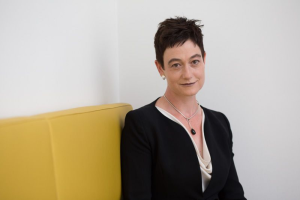JRF’s director of emerging futures, posed three questions for participants at the Foundation’s 2024 Next Frontier’s conference: what is this moment we are living through and how should we respond to it? Where does wealth need to flow for the future welfare of people and planet? How can we use wealth in ways that are not exploitative and extractive?
The first panel reminded us of the urgency of the questions. Everything is on the brink of change, said Indy Johar of Dark Matter Labs, yet we are still tinkering. Philanthropy, he argued, should be looking at its funding and its mission from a climate breakdown perspective. It’s not. The choice – which is no choice – is between mutually assured thriving or mutually assured destruction. Aarathi Krishnan of RAKSHA noted that an obstacle to funding flowing where it is needed is that a few people are still assessing where risk lies and ‘unless we feel the effects of climate change every day, we’re not going to rate it,’ she said.
Hope financing
Kirsten Dunlop of Climate KIC remarked that we have too narrow a conception of wealth. If you think about money, we – governments, donors and funders of all kinds – are doing status quo financing and our biggest threat is the status quo. We have to work together in an unprecedented way. What if, instead of financing things we are sure will work, we begin to invest in those things which look as if they will combat the certainty of collapse? We don’t have time to wait for proof of concept. And people are doing this, she said. The question is, how do we create aggregation so that we reach a critical mass? ‘We need hope financing. It’s us we need to work on, not the planet.’ This panel incidentally revealed one of the quirks of the conference presentation. Kirsten Dunlop was the only one of the panel on the stage. The others joined virtually on a big screen, their heads looming gigantically, alarmingly, compelling the audience’s attention even when they weren’t speaking.
Young people are at the sharp end of the polycrisis. The 18-30 group have great anxiety about the future. They don’t know if they’ll ever own a house, have children or will get a pension, said Euella Jackson of Rising Arts Agency in Bristol. The traditional anchors to society are missing, but young people will be the future stewards of wealth and of the planet. How can funders support them to fulfil those roles responsibly and wisely? Governance is critical here because young people don’t feel they have access to those in leadership positions – it’s as if those who become leaders put on some mask which obliges them to behave differently, she said.
Three preconditions for intergenerational fairness
Amira Hayat signalled the important role creativity could play both in finding a space for them to deal with their anxiety – creativity is a form of validating their individuality and it allows them to express their views, which are often passionate, about the current situation. Sophie Howe, the Future Generations Commissioner for Wales (she is breaking new ground – it is the first post of its kind anywhere in the world), also noted the weight of anxiety young people feel. It came up nearly every time in her conversations with young people. She suggested three preconditions for ingenerational fairness: the involvement of the young people in shaping policies; political champions; and institutional capacity (in terms of officials, civil servants, etc). What could funders do to help bring awareness of the future into the present? They could use the opportunity offered by the forthcoming UN Declaration on Future Generations to raise awareness and support governments to build that capacity. What’s not needed she said (to considerable applause) are more toolkits and more frameworks. Funders need to work alongside officials in practical ways. They need support as well as challenge.
The importance of right relationships
Do wealthy people have a role to play in realising social justice (however conceived) beyond giving money? According to an audience poll, they do. A whopping 82 per cent voted ‘yes’. In fact, the consensus of a session on Humanising and Organising Wealthy People suggested an important connection between giving and participating. We often have biases and assumptions about rich people – they think people just want their money. This creates suspicion on both sides, argued Rye Young of the Sprocket Foundation. He and his fellow panellists agreed that the important thing in working with wealthy donors is the development of relationships. Wealth insulates people from communities and destroys resilience, argued Iris Brilliant, a money coach for wealth-holders. ‘Don’t be deferential,’ she urged. A cause and effect of the remoteness of the wealthy is that we tiptoe round them which accentuates the sense of caste and is disrespectful. Again, ‘it’s about being in a right relationship. Support them in unlearning the assumptions and expectations they have.’
There are signs that some of the mutual suspicion is being disarmed, said Rajasvini Bhansali of Solidaire, especially among the young wealthy who understand that their wealth does not come from merit, but often from injustices done to others, so movements are beginning to build, but those movements need leadership and, although investing in rich people seems paradoxical, much might depend on it. Moreover, it must be leadership to encourage leadership, in order that the wealthy can bring their influence to bear on critical questions. ‘Tax reform,’ she argued, ‘will depend on the leadership of rich people working against their own interests.’
Fear is often at the heart, too, of the reluctance of financial advisers and others, whom Kate Barron-Alicante of Capital J dubbed the wealth defence industry, to invest where money is needed. In this case, it is fear of the opinion of peers. This leads investors, for instance, to protect endowments at the expense of missions, argued Dana Bezerra, formerly of the Heron Foundation, now an adviser to Greater Share. The more proximate embarrassment in front of colleagues following a loss of revenue was taking preference over the infinitely greater, but often invisible risk of the consequences of failure to invest. The financial defence industry isn’t comprised of bad people, she said, but they are stuck in a system that rewards productivity in its own terms. We have to keep nagging them so that the wider context is drawn to their attention. How can that be done? Dr Astrid Scholz of Armillaria pointed to the need for a community of mutual support for those who are aware of this wider context. Since the session was about hacking the wealth defence industry, she also suggested algorithms that would make information about how and where to invest follow people around like unsolicited ads on social media.
Recreating the Covid mentality
Climate risks mean that community response is critical, argued Immy Kaur in a session on community stewardship, because neighbourhoods are where the consequences will play out. Covid showed us what communities can achieve from their own resources and we need to return to that outlook. Philanthropy is important here. Public libraries and health services are examples of how it can lay the basis for what will become public goods. Juliet Can of the Stour Trust spoke of their work in buying or renting building as community assets, which provide a physical focus for that community, especially when that community has been previously displaced. Jess Steele of Hastings Commons endorsed the importance of this. Buildings provide social spaces, accommodation and workplaces for local people, yet the current ownership model leads to exploitation by temporary, often remote, landlords with no stake in the community. The result can be derelict buildings which have become eyesores, rather than assets. We need to change who controls and transforms our neighbourhoods, urged Bex Trevelyan of Platform Places.
Donors need to get together with community asset-builders and Dilys Winterkorn of Pathway Fund, the first black-led impact investment fund in the UK offered the work of the Fund as an example. While the Fund’s long-term aim is greater racial equity, she sees asset acquisition as critical to this, since so many other things flow from it, and therefore, its focus is on physical structures, too. Another factor should be added here. Crucial to the success of the Hastings Commons, says Jess Steele, has been the ecosystem of local organisations working together. The spirit of the session was summed up in their slogan: ‘We look out for each other and look after the place.’
Modernity’s dream of control is at an end
The future will demand of us things we are unprepared for. What capacities will we need, wondered Cassie Robinson of JRF’s Emerging Futures programme? For one thing, said Justin Cook of the Centre for Complexity, we will need to find forms that ‘embrace the mess’. Modernity’s dream of control is at an end. Big problems don’t have one ‘owner’, he pointed out and no agency can either take responsibility or produce a solution for them. We have to find neutral spaces where many stakeholders can have a say and be heard.
Creativity and the need to look to the non-rational were constants of the conference. It had opened with a song by Azul Duque, a performer and educator, which evoked the role of music and art in times of collapse. Amira Hayat, too, advocated the use of creativity to unchain the voices of the young, Dr Syrus Marcus Ware pointed to the use of speculative fiction as a means of ‘practising the future’ and Elissa Sloan Perry of Prefigurative Futures Lab urged funders to ‘invest in imagination’ as investments can no longer be based on proof of concept, she said, echoing an earlier participant.
After all, it’s difficult to think of things which, almost by definition, don’t exist and artists and those whose principal means of investigation is their imagination, rather than their intellect, may well be the best guides to discerning what is not.
The concluding reflections reiterated what had been said in different forms throughout: money needs to move urgently and in different ways to the means of transition, some of which had been discussed during the day – self-organising and self-regenerating neighbourhoods, bio-regions, platforms to encourage the participation of young people, social movements – which offer small islands of coherence in the midst of disintegration.
Overall, the morning of the conference was full of lively and enthralling sessions. There were many inspiring and engaging presentations, with people providing heartening examples of resistance to the rising tide of hopelessness. Presenters spoke with intelligence and passion. In the afternoon, the conference lost its way a little. Maybe it was because of my choice of the sessions I attended. Maybe it was session fatigue but, for me at least, there was less sense of force and movement. All of the participants in all of the sessions were encouraged at the end of the session to find reasons to hope and many did, but the prevailing impression was that, while there are many local sources of optimism, the big picture remains gloomy. Emblematic of this was that, at the end of the first session, chaired by Indy Johar, he asked Kirsten Dunlop to enumerate some sources of hope. She was about to do so, when time ran out. Let’s hope this isn’t a metaphor for the fate of all of us.
Andrew Milner is Features Editor for Alliance magazine








Comments (0)